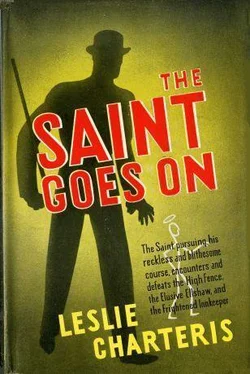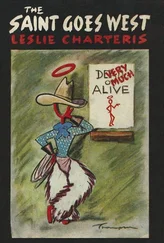From the handrail of the grating where he stood, it was an easy swing to his bathroom window, which was open. He passed across the sill like a shadow and went from room to room with a gun in his hand, searching the darkness with supersensitive faculties for anything that might be waiting to catch him unawares. Everything was quiet; but he touched pieces of furniture, and knew that they had been moved. The drawers of his desk were open, and his foot rustled against a sheaf of papers carelessly thrown down on the floor. Without touching a light switch he knew that the place had been effectively ransacked; but he came to the hall without finding a trace of any more actively unfriendly welcome.
It was not until he switched on the hall light that he saw what his fate ought to have been.
There was a cheap fibre attache-case standing close to the entrance — if he had moved another step to one side he would have kicked it. Two thin insulated wires ran from it to the door and terminated in a pair of bright metal contacts like a burglar alarm, one of them screwed to the frame and the other to the door itself. If he had entered in the normal way, they would have completed the circuit directly the door began to open; and he had no doubt what the sequel would have been.
An ingenious mixture of an electrical detonator, a couple of pounds of gelignite, and an assortment of old scrap-iron, was indicated inside that shabby case; but the Saint did not attempt to make certain of it, because it was not beyond the bounds of possibility that some eccentric entrance as he had made could have been foreseen, and a second detonator provided to act on anyone who opened the valise to investigate it. He disconnected the wires, and drove out to Hammersmith Bridge with the souvenir, very cautiously, as soon as he could fetch his car from the garage, and lowered his potential decease on a string to the bottom of the Thames.
So far as he could tell, only the three five-pound notes which he had put away in his desk had been taken. It was this fact which made him realise that the search of his rooms had not been a merely mechanical preliminary to the planting of a booby-trap by one of the many persons who had reason to desire his funeral. But it was not until the next morning that he realised how very important the disappearance of Mr. Ellshaw must be, when he learned how Mrs. Ellshaw had left her troublesome veins behind her for all time.
The body was taken out of the Thames just below London Bridge by the river police. There were no marks of violence beyond a slight bruise on the forehead which might have been caused by contact with the piers of one of the upper bridges. Death was due to drowning.
"It's as obvious as any suicide can be," said Chief Inspector Claud Eustace Teal. "Apparently the woman's husband left her about a year ago, and she had to work like a slave to keep the children. Her neighbours say she was very excited the night before, talking incoherently about having seen her husband and him having refused to recognise her. If that was true, it provides a motive; if it wasn't, it covers 'unsound mind.' "
The Saint lounged back in his chair and crossed his feet on a sheaf of reports on Mr. Teal's sacred desk.
"As a matter of fact, it was true," he said. "But it doesn't provide a motive — it destroys it."
If anybody else had made such a statement Mr. Teal would have jeered at him, more or less politely according to the intruder's social standing; but he had been sitting at that desk for too many years to jeer spontaneously at anything the Saint said. He shuffled his chewing gum to the back of his mouth and gazed across the Saint's vandal shoes with soporously clouded eyes.
"How do you know?"
"Because she came to see me yesterday morning with the same story, and I'd promised to see what I could do for her."
"You think it was murder?" asked Teal, with cherubic impassivity.
Simon shrugged.
"I'd promised to look into it," he repeated. "In fact, she had a date to come and see me again on Friday evening and hear if I'd managed to find out anything. If she had enough faith in me to bring me her troubles in the first place, I don't see her diving into the river before she knew the verdict."
Teal brought his spearmint back into action, and worked on it for a few seconds in silence. He looked as if he were on the point of falling asleep.
"Did she say anything to make you think she might be murdered?"
"Nothing that I understood. But I feel kind of responsible. She was killed after she'd been to see me, and it's always on the cards that she was killed because of it. There was something fishy about her story, anyhow, and people in fishy rackets will do plenty to keep me out of 'em… I was nearly murdered myself last night."
"Nearly?" said Mr. Teal.
He seemed disappointed.
"I'm afraid so," said the Saint cheerfully. "Give me something to drink and find out for yourself whether I'm a ghost."
"Do you think it was because of something Mrs. Ellshaw told you?"
"I'm damned if I know, Claud. But somebody put down all the makings of a Guy Fawkes picnic in Cornwall House last night, and I shouldn't be talking to you now if I hadn't been born careful as well as lucky — there's something about the way I insist on keeping on living which must be frightfully discouraging to a lot of blokes, but I wouldn't believe for a moment that you were one of them."
Chief Inspector Teal chewed his way through another silence. He knew that the Saint had called on him to extract information, not to give it. Simon Templar gave nothing away, where Scotland Yard was at the receiving end. A Commissioner's post-mortem on the remains of a recent sensational case in which the Saint had played a leading and eventually helpful part had been held not long ago: it had, however, included some unanswerable questions about the fate of a large quantity of stolen property which the police had expected to recover when they laid the High Fence by the heels, and Mr. Teal was still smarting from some of the things which had been said. He had been wielding his unavailing bludgeon in the endless duel between Scotland Yard and that amazing outlaw too long to believe that the Saint would ever consult him with no other motive than a Boy Scout ambition to do him a good turn. Every assistance that Simon Templar had ever given the Metropolitan Police had had its own particular string tied to it, but in Teal's job he had to take the strings with the favours. The favours had helped to put paid to the accounts of many elusive felons; the strings accounted for many of the silver threads among Mr. Teal's dwindling fleece of gold, and seemed likely to account for many more.
"If you think Mrs. Ellshaw was murdered, that's your affair," he said at last. "We haven't any reason to suspect it — yet. Or do you want to give us any?"
Simon thought for a moment, and said: "Do you know anything about the missing husband?"
"As a matter of fact, we did use to know him. He was about the worst card sharp we ever had on our records. He used to work the race trains, usually — he always picked on someone who'd had too much to drink, and even then he was so clumsy that he'd have been lagged a dozen times if the mugs he found hadn't been too drunk to remember what he looked like. Does that fit in with your theory?" Teal asked, with the disarming casualness of a gamboling buffalo.
The Saint smiled.
"I have no theory, Claud. That's what I'm looking for. When I've got one, we might have another chat."
There was nothing more to be got out of him; and the detective saw him go with an exasperated frown creasing down over his sleepy blue eyes.
As a matter of fact, the Saint had been perfectly straightforward — chiefly because he had nothing to conceal. He had no theory, but he was certainly looking for one. The only thing he had kept back was the address where Mrs. Ellshaw had seen her mysterious husband. It was the only information he had from which to start his inquiries; and Mr. Teal remembered that he had forgotten to ask for it five minutes after the Saint had left.
Читать дальше












